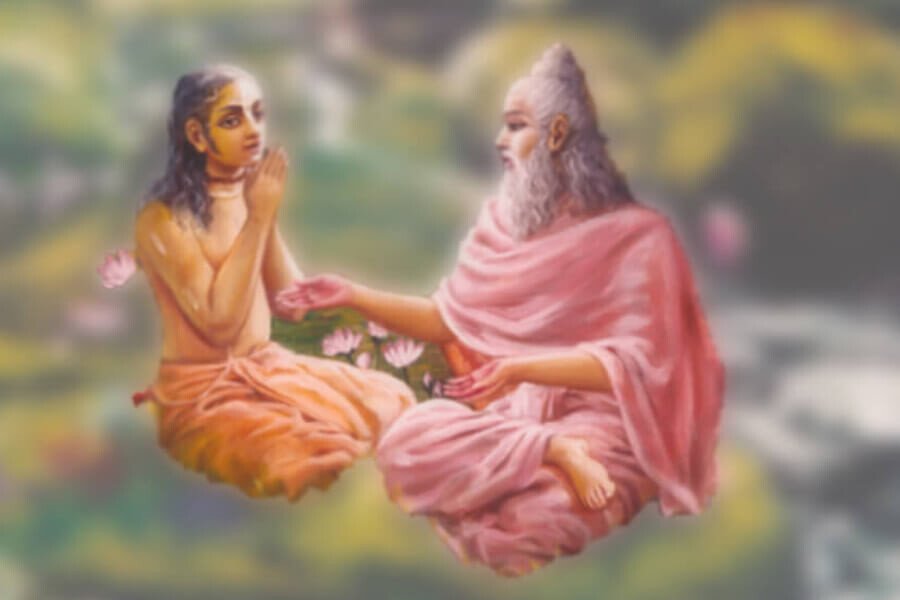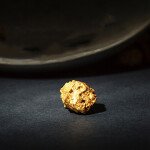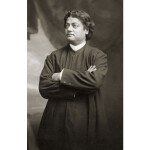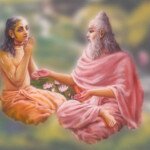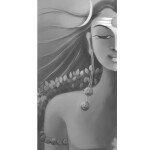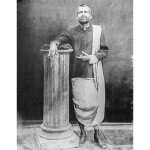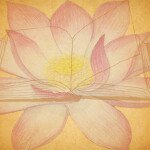The Upanishads are profound meditations on the truth of the Supreme Self, and constitute the principal source of Vedantic mystical knowledge. The word Upanishad ( उपनिषद् ) is derived from the roots upa (by) and ni ṣ ad (sitting down). Literally, Upanishad means the student or seeker sitting in the presence of the Guru, the Master, and receiving the knowledge of the Self.
However, the Upanishadic process was always dialogic — questioning, and even challenging, the Master to dispel one’s doubts was very much expected and encouraged.
This particular story, amongst the most popular in the Vedantic tradition, illustrates one of the great Upanishadic Mahavakyas — Tat twam asi, That thou art. (Ed)
"No idiot has yet been born in our line nor has any in our family neglected the study of the Vedas. So, young soul, go to a gurukula, be a brahmachari and learn the Vedas." The sage Uddalaka Aruni thus addressed his young son, Svetaketu, when he attained the proper age to go to a preceptor for study.
The dutiful son obeyed his father. After studying all the Vedas for twelve long years at the feet of his guru, he came home. When the father saw him, he could at once perceive that his son had become a man of learning but that he had missed spiritual training and teaching. Instead of humility he had developed conceit and instead of peace, there was turmoil in his mind.
One day the father said to him, “Dear child, did you not ask your guru to teach you that mystic wisdom which is the key to all other knowledge, to all other thought, and that wisdom which unfolds the Unknown to man?”
Svetaketu was not a little surprised when he was thus accosted by his father. He instinctively felt that something was lacking in his own education. So he said to his father, “Dear father, what is that wondrous knowledge that you speak of? Do teach me that yourself. Obviously my guru did not know the knowledge you refer to, otherwise he would not have failed to impart it to me.”
"Dear child, it is something like this. You know that these earthen pots and toys are made of clay. Once you understand the essential nature of the clay of which these are all made, you know and understand all these things also. Then all these are mere forms and names of forms, which the clay has assumed. The essence of them all, the thing that matters is the clay. So too if you understand the nature of a particular metal, everything that is made of that metal is known to you. The various things that are made of that metal are then mere names and forms. What matters is the metal and its nature. Take the various things made of steel such as a sword, a razor, a knife, a needle. When you know the nature of steel, all these are but names and forms, which that steel assumes. What matters is the steel and your knowledge of it. That is the essential truth. All else is mere verbiage. So you should get to know the essence of things, the one thing that underlies this vast and multitudinous mass of name and form.
"In the beginning of things there was pure Being, one without a second. It willed that it should become many. Then it manifested itself in many forms, such as light, liquid, solid and so on. This rich variety of things came into existence by permutation and combination of these forms. Then life appeared, and among the living beings, man with his varied powers and functions.”
After listening to all this the son said, “Father, all this is very interesting. Excuse me for a question. Where does a man go when he sleeps?”
Uddalaka replied, “When a man sleeps he becomes for the time being one with the Spirit or one with the one eternal Being. He is merged in himself as it were. A man's mind is like a beast tied to a peg by a long rope. It turns round and round the peg but cannot get away. So too does the mind turn round the prana or the vital power in the body but cannot leave the body. When a man is about to die, his power of speech is merged in his mind, his mind is absorbed in the prana, the prana is again in its turn merged in light and this light merges in the power beyond. That power is subtle. It pervades the universe. That is the Truth. That is the Spirit. That thou art, O Svetaketu!”
The son again said, “I am not fully satisfied. Tell me more of this great wisdom, so that I can understand.”
"Dear child, bees bring tiny particles or droplets of honey from various flowers and store it in the hive. Once in the hive, do the droplets know from which flower they came? Need they know it? So too all these beings when they merge in the ocean of Being, they know not whence they came. They lose all individuality. Whether it is a lion, a tiger, a mouse or a worm before merging, all become one when they have once merged in the ocean of consciousness. That in which all these merge is the One Being. That is subtle. It pervades everything. It is the Spirit or Atman or Pure Consciousness. That thou art, O Svetaketu!
"Dear child, various rivers from the four quarters flow into the vast seas. They all become one with the seas. Can you then make out the waters of the various rivers? No. So is the case with these various beings when they merge in the One Being. That thou art, O Svetaketu!
“If you strike a tree at the root, or in the middle or at the top, some sap oozes out but the tree still lives. If you cut off a branch here and there from the tree, that branch fades and dies away but the tree still lives on. Thus that which is deprived of its life dies but life itself does not die. The power by which life lives eternally is the Spirit. That thou art, O Svetaketu!”
Svetaketu listened to all this very attentively but he was still at a loss to know as to how to comprehended the intangible Atman. So he asked his father, “How to know this subtle thing, dear father? Tell me that.”
Then Uddalaka thought of a simple device. He pointed out to a big banyan tree nearby and asked his son to bring a ripe fruit from that tree. When he brought the small red berry-like fruit, he told his son, “Split it into two, dear child.”
“Here you are. I have split it into two.”
“What do you find there?”
“Innumerable tiny seeds of course, and what else can these be?”
'Well, take one of those tiny seeds and split it again."
“Yes, here it is. I have split a seed.”
“What do you find there?”
“Why, nothing at all.”
“O dear child! This big tree cannot come out of nothing. Only you cannot see that subtle something in the seed from which springs forth this mighty tree. That is the power, the spirit unseen, which pervades everywhere and everything. Have faith. It is that spirit which is at the root of all existence. That thou art, O Svetaketu!”
“'This is something very baffling, father. But how on earth can I realize it, even if I merely know it?"
Uddalaka said, “Just do one thing. Take a few crystals of salt and put them into a bowl of water while you go to sleep and bring it to me in the morning.”
The obedient son did as he was told and on the next morning took the bowl to his father.
The father said, “Dear son, take out the salt please.”
Svetaketu felt exasperated and said, “Father, what do you mean? How is it possible to take out that salt?”
“All right. Then just taste the water on the surface. How does it taste?”
“It is saltish and is bound to be so.”
“Take the water in the middle and at the bottom and tell me how it tastes.”
“Well, that too is saltish and is bound to be so."
“My dear child, do understand now that the Spirit I spoke of pervades all existence like the salt in this water in the bowl. That is the Subtle Spirit. That thou art, dear Svetaketu!”
“Dear father, how to go about all this? It looks so simple and yet is so very difficult.”
Uddalaka said, “Now I shall tell you how to go about trying to realize the Spirit. Suppose we blindfold a man and lead him into an unknown forest away from his usual residence. What would he do? How would he try to find his home? As soon as he is left to himself, he would just remove the cover from his eyes. Then he would wander about inquiring for the region from which he was taken away. He would go from village to village and ultimately he would come across someone who would lead him in the right direction. Thus would he reach his home. That is the way to find out the spiritual home from which we have all strayed into the wilderness. The Spirit is the one reality towards which we have all to direct our steps. That thou art, O Svetaketu!”
Thus spoke Uddalaka Aruni in the Chandogya Upanishad.


